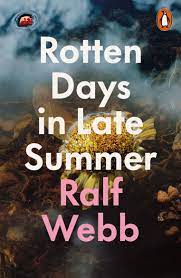Rotten Days in Late Summer (Shortlisted, Forward Prize for Best First Collection)
Ralf Webb
(Penguin, 2021); pbk: £9.99
It’s easy to trace
our present backwards, replaying the memories
frame by frame. There’s even [breathe]
some comfort in it, despite the resulting sightlessness.
(‘Treetops’)
Here is a young poet’s first collection, tracing the fallout from his father’s terminal illness and death, and which moves through the narrator’s own depression, self-loathing, self-harm and experience of bi- and homophobia. A collection opening with the trigger warning ‘ A Note on Content’ outlining themes, suggesting those ‘who have struggled or are currently struggling with these issues may not wish to read this book alone, or without a trusted friend.’ Relevant helpline numbers are given. This may set up certain expectations of a jagged, and perhaps slightly worthy, if raw, confessional. The reader may wonder if we have come too far protecting readers.
A young poet’s debut collection, yes, but it doesn’t mean that this is the work of someone lacking a considerable literary apprenticeship. Managing editor of the prestigious journal The White Review from 2017-21, and with other significant marks in his C.V., Webb’s confessional darkness and depth is held together by an extraordinary written sharpness, from the overarching structure to each line’s precision. Thematically lacerating content is delivered in poised and meticulously edited poetry, which takes its responsibilities to language as fully as its care for its detonating subject matter. Confessional poetry sometimes comes to the published page eager, with a first draft aspect, offered as a stamp of its authenticity, Rotten Days in Late Summer‘s approach is quite different.
The sounds he makes are like butterflies trapped in a room at the height of summer, flying again and again into a shut window. […]
(If only he had health enough to smash the glass, or to burn down the room, or to call the outside inside.)
We have been waiting for this day, and have become so accustomed to the waiting that when it arrives we can no longer be roused in time.(‘Diagnostics’)
Set in the West Country of Webb’s youth, this is challenging pastoral. No romantic bucolic; it’s as much pocked with bunkers, and gathering weed-smoking youths as it is of scrumped apples, worth comparing with Jacob Polley’s Cumbria in Jackself as an examination of a masculine coming of age in the landscape perhaps. How those involved live, work and interact with that environment is in the poetry’s essence.
Opening with a sequence of just-connected poems (concluding with almost Pope-like bite of ‘The Country Manor Hotel’), Rotten Days is punctuated throughout by a poem series, each entitled ‘Love Story’, and each a grouping of three sonnet-formed stanzas. The book’s postscript advises the reader that each poem’s ‘you’ is different. ‘Some […] are women; others are men’. That seemed slightly superfluous.
Webb never goes easy on himself, and his retrospective awareness of own immaturity (‘Love Story: Lies’) is often mordant. Here, as elsewhere, we see his ability to stitch a metaphor deftly, picking up its thread unexpectedly.
Charting the time around his father’s death, and twenty pages long, ‘Diagnostics’ is an articulation of poems, balancing prose poems with a single stanza of reflective verse. Devastating, and yet not lacking humour (the collie, both as metaphor and reality, is pitch-perfect).
The connecting/ disconnecting poems following seem crucial before, and after, the breathtaking formality of ‘Treetops’, an extended poem of 62 eight line stanzas.
Each lash is coldly calculated
and barely felt[…]
with its indulgent tinkerings and slicings
its freely associative modifications.
Webb has much to consider in where our agency really lies, how we connect and when we do not.
Earlier, I queried that collection-opening trigger warning. Damned right we do. Webb’s concern and responsibility for his reader is wholly justified. We need more of that. Also, we need to hear more from Ralf Webb.
When one soul encounters another, they make a Venn diagram.
The overlap is the epicentre of fluency.
(‘The Traveller hasteth in the Evening’)
Beth McDonough


Leave a Reply